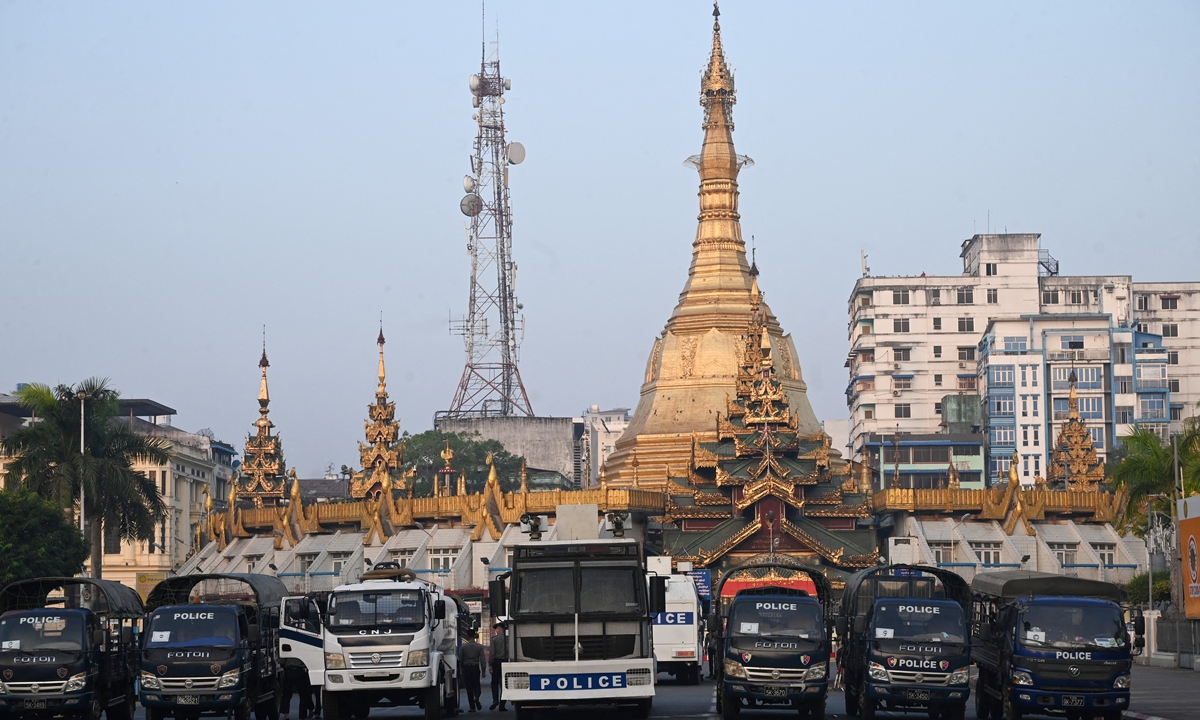
Police vehicles barricade a road outside Sule Pagoda, next to Yangon City Hall in Yangon, Myanmar on February 16. Photo: AFP
Myanmar's shadow government - the National Unity Government (NUG) composed of ousted NLD lawmakers - on Tuesday launched a "people's defensive war"against the military government that took power in February. It urged citizens across the country to revolt against the military rule by joining the "public revolution." In a video address, acting president of the NUG Duwa Lashi La called on the People's Defense Forces and ethnic armed forces to "immediately attack" the military.
The People's Defense Forces were established in May. It pledged loyalty to the NLD and only has a small number of members. The military government branded the NUG and People's Defense Forces as terrorist groups, while Duwa Lashi La called the military government "military terrorists led by Min Aung Hlaing."
The situation in Myanmar is showing a dangerous trend of further deterioration. Myanmar has witnessed long-term political turmoil. There are intertwined conflicts between the military and anti-junta rule political parties as well as between the ruling government and ethnic armed forces. If armed clashes are indulged and political extremist action is encouraged, then the country will be plagued by endless battles and trouble.
It's time for Myanmar to choose: solve internal conflicts by fighting and bombing, or sticking to the principle of peace and inclusiveness. Internal conflicts within Myanmar are tense. Worse, international views over the Myanmar issue tend to have different preference, which provides incessant driving forces for civil unrest in Myanmar.
Myanmar's neighboring countries believe that peace and stability are of paramount importance to Myanmar and are willing to help promote peace among all parties in the country. This is not only China's attitude. ASEAN pretty much shares the same stance. However, the US and the West are taking sides, supporting the NLD government, which was overthrown by Myanmar's military, to assume power. This has provided NLD more hope to oust the junta through escalating confrontations against it.
Western countries won't necessarily be able to turn the situation in Myanmar into a "civil war" by only mobilizing Myanmar's shadow government and "People's Defense Force." Myanmar's military has deep-rooted power in the country. Since the crisis in February, it has gone through waves of protests by NLD supporters, bomb attacks by the "People's Defense Force" and sanctions from foreign countries. But they have always been able to take the situation under control. It mirrors the different characteristics of Myanmar's military as a special political force, compared with general troops.
Myanmar has a 600,000-strong army. Even when the NLD was in power, the military still kept 25 percent of the seats in the Myanmar parliament.
But if the US and other Western countries openly support anti-junta forces, including the "People's Defense Force," militarily, taking the step to provide them with a large number of weapons, a real "civil war" may take shape. The Myanmar situation will turn a new page.
The NLD is still the legitimate party in Myanmar. Its previous stance does not include publicly supporting attacks that target the military and government agencies. If the NLD participates and leads a "revolution," it will lead to a turnaround in Myanmar's situation.
China adheres to a foreign policy that does not interfere in the internal affairs of other countries. For China, Myanmar's peace is the most important. If Myanmar is in chaos, its refugees would flee to China. The investment of Chinese businessmen in Myanmar will be under serious threat. In the past when the Myanmar military clashed with ethnic armed forces, bombs were dropped into Chinese territory occasionally.
As a Chinese media outlet, we oppose any policy adopted by the US and Western forces that would further worsen the situation in Myanmar. For us, their political declaration matters nothing to them but will only harm Myanmar. It has been proven that the Western-style system does not fit Myanmar. The country needs to face reality and explore a political framework accepted by all sides to realize national and political reconciliation.
At the critical juncture when Myanmar's shadow government called for a "revolution" by advocating a civil war, the attitude of the international community is very important. We hope the Western world could focus on the tangible benefits of the Myanmar public and not support a civil war so as to shoulder due responsibilities to save the situation of Myanmar.




